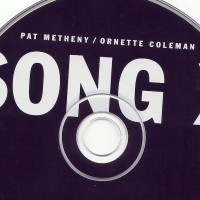by Pico
From 1950 to 1975 Harmolodics has always existed in my writing and playing. Yet I did not have a Harmolodic Band to compose and perform with as a working band. I often speak about being a composer that performs without prejudice of environment.
–Ornette Coleman, from the Body Meta liner notes.
“Harmolodics,” a conception of Coleman’s regarding a basic approach to music is not that simple to describe, except in broad terms. But listening to Ornette’s unique sound long enough and you begin to understand. To my ears, it means harmonic progression without a tonal center. It can sometimes sound dissonant and sometimes rather agreeable but never tied to Western conventions about song structures or melodic flow.
That’s the core aim of Coleman; if his songs are to connect to the listener, it connects at the absolute base level of what “sounds good” and not because it follows some preconceived formula. The song, as Coleman himself states above is “without prejudice of environment.”
However you describe it, the theory of “harmolodics” didn’t really get put into practice according to it’s conceiver until Coleman formed his Prime Time band in 1975. A radical departure from even his previous unusual configurations, Coleman hired two electric guitarists (Charlie Ellerbe, Bern Nix), one electric bassist ( Jamaladeen Tacuma née Rudy McDaniel), and two drummers (Ronald Shannon Jackson and Ornette’s son Denardo). And of course, Ornette’s singular alto sax.
When these guys got together in Paris that year for sessions that produced Body Meta and Dancing In Your Head they brought Coleman’s radical approach to music to the latter 20th century. Hearing these more contemporary instruments fleashing out his vision made the music sound familiar compared to his acoustic works and completely strange at the same time.
But before this becomes a professorial lecture dissecting the man’s vast body of music, let’s simply take one song of his catalog and just enjoy the damned thing. This is just another “One Track Mind,” after all.
The first track from the earlier released album Body Meta does a beautiful job in forcing the listening to hear familiar tones and shapes in a non-familiar context. “Voice Poetry” starts out with a funky creole beat that could have been lifted from The Meters’ “Hey Pocky A-Way.” One guitar playing rhythm enters with a conventional chord until the other guitar follows close behind playing single note lines and begins a weird chord progression. But it’s Tacuma that provides the biggest departure from convention; he plays mainly in a much higher range than what a bass player would normally play in and rides on top of the groove instead of being in it.
At the two and a half minute mark, Colemen announces himself with a sweet alto sound playing long, romantic lines that appear at first to be ignoring the more contemporary groove of the band. But gradually, Ornette is playing more with the band as Jackson is becoming more daring, going all-fills while the second guitar is playing freer. What started as a slightly-off kilter r&b tune starts going in in whatever direction the melody takes them. Inevitably, Jackson abandons the 4/4 beat to play along with the solists, leaving the first guitar to keep the song grounded in the beat.
Eventually, Coleman returns to his long old-school lines and as if to sharpen the contrast, the lead guitarist switches to an acid fuzz tone. About a minute later, the song quickly crashes to the end.
“Voice Poetry” is a pretty good illustration of the rare beauty in Coleman’s music. If you listen to his music with preconceptions, you’re not likely to enjoy it. But take those preconceptions away and it starts to make some sense (not always, but when it does, it’s audial bliss). Moreover, “Voice Poetry” also teaches us that funk, even free-funk that is hard to dance to, is not a European or African precept; it’s a basic human compulsion.
Listen: Ornette Coleman “Voice Poetry”
Purchase: Ornette Coleman – Body Meta
“One Track Mind” is a more-or-less weekly drool over a single song selected on a whim and a short thesis on why you should be drooling over it, too.
- Roscoe Mitchell – ‘One Head Four People’ (2024) - January 6, 2025
- Cheer-Accident – ‘Vacate’ (2024) - January 3, 2025
- Patrice Rushen – ‘Prelusion’ (1974, 2024 Remaster) - January 2, 2025




